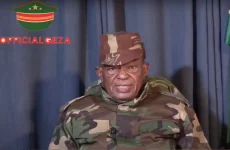Tensions grow in Zimbabwe as war hero Blessed Geza asks people across the country to join street protests against President Emmerson Mnangagwa. He wants the leader to step down from power. Geza used to support the ruling ZANU-PF party as a member of their Central Committee. He also belonged to the group of veterans who fought for freedom. These days, he speaks out strongly against the President. He claims that Mnangagwa steals money, ruins the economy, and tries to stay in office longer than the law allows. Current rules say presidents can only serve two terms, which means Mnangagwa must leave by 2028.
Geza plans what he calls a revolution for March 31, 2025. He asks all citizens to come out into the streets that day. He posted videos on YouTube and Twitter where he wears army clothes but asks for peaceful action. He even spoke directly to the police, asking them not to hurt the people who were protesting. The police have labeled Geza a criminal. They charged him with making people violent and disrespecting the president. Officers search hard but cannot find him. Some reports say he escaped to South Africa. Geza hints he stays inside Zimbabwe, hidden by friends who agree with his ideas.
The government reacted fast and hard against these threats. Information Minister Jenfan Muswere called the messages crazy talk. He warned the government stands ready to crush any protests. President Mnangagwa himself called Geza and his backers troublemakers. He told his party members everything remains under control. Behind the scenes, Mnangagwa replaced many top military leaders. Experts see this as his way to remove anyone who might turn against him. The recent firing of army commander Lieutenant General Anselem Sanyatwe raised eyebrows. That general had close ties to Vice President Constantino Chiwenga, who helped push out former President Robert Mugabe in 2017. Chiwenga has said nothing about Geza, making people wonder about fights inside the ruling party.
The military holds great power in Zimbabwe politics. They helped remove Mugabe from office. No clear signs show the army splitting apart, but the leadership changes suggest Mnangagwa feels unsure about their loyalty. Geza keeps gathering supporters through social media despite running from the police. His Twitter account and YouTube channel gained many followers quickly. They serve as his main way to spread anti-government messages. Friends like Knox Chivero publicly back Geza, showing that an organized network keeps these accounts running and coordinates their messages. Experts doubt many people will join large protests. Political analyst Stephen Chan believes that Zimbabweans fear violent attacks if they protest. Most doubt another big demonstration can succeed. Opposition groups react carefully, afraid they might help one faction of ZANU-PF fight another.
If March 31 passes with small protests, President Mnangagwa may come out stronger. He could then push ahead with plans to change term limits in the constitution. He might also crack down harder on anyone who opposes him. This would give him more power during important upcoming years. The clock ticks toward March 31 with unknown results ahead. The call for protests has definitely shaken Zimbabwe politics. It shows internal divisions and increases debates about democracy in the country. Both sides prepare for what might become a turning point in Zimbabwe history as that date approaches.
Geza plans what he calls a revolution for March 31, 2025. He asks all citizens to come out into the streets that day. He posted videos on YouTube and Twitter where he wears army clothes but asks for peaceful action. He even spoke directly to the police, asking them not to hurt the people who were protesting. The police have labeled Geza a criminal. They charged him with making people violent and disrespecting the president. Officers search hard but cannot find him. Some reports say he escaped to South Africa. Geza hints he stays inside Zimbabwe, hidden by friends who agree with his ideas.
The government reacted fast and hard against these threats. Information Minister Jenfan Muswere called the messages crazy talk. He warned the government stands ready to crush any protests. President Mnangagwa himself called Geza and his backers troublemakers. He told his party members everything remains under control. Behind the scenes, Mnangagwa replaced many top military leaders. Experts see this as his way to remove anyone who might turn against him. The recent firing of army commander Lieutenant General Anselem Sanyatwe raised eyebrows. That general had close ties to Vice President Constantino Chiwenga, who helped push out former President Robert Mugabe in 2017. Chiwenga has said nothing about Geza, making people wonder about fights inside the ruling party.
The military holds great power in Zimbabwe politics. They helped remove Mugabe from office. No clear signs show the army splitting apart, but the leadership changes suggest Mnangagwa feels unsure about their loyalty. Geza keeps gathering supporters through social media despite running from the police. His Twitter account and YouTube channel gained many followers quickly. They serve as his main way to spread anti-government messages. Friends like Knox Chivero publicly back Geza, showing that an organized network keeps these accounts running and coordinates their messages. Experts doubt many people will join large protests. Political analyst Stephen Chan believes that Zimbabweans fear violent attacks if they protest. Most doubt another big demonstration can succeed. Opposition groups react carefully, afraid they might help one faction of ZANU-PF fight another.
If March 31 passes with small protests, President Mnangagwa may come out stronger. He could then push ahead with plans to change term limits in the constitution. He might also crack down harder on anyone who opposes him. This would give him more power during important upcoming years. The clock ticks toward March 31 with unknown results ahead. The call for protests has definitely shaken Zimbabwe politics. It shows internal divisions and increases debates about democracy in the country. Both sides prepare for what might become a turning point in Zimbabwe history as that date approaches.












